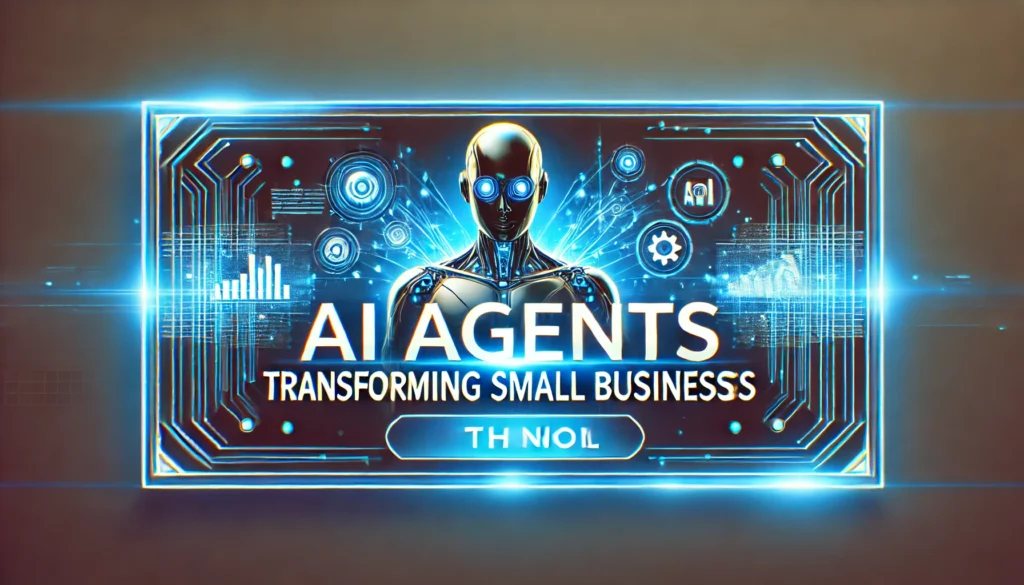Table of Contents

In today’s rapidly evolving business landscape, small and medium-sized enterprises (SMEs) face the constant challenge of competing with larger, resource-rich organizations. The good news? Artificial intelligence (AI) is stepping up as the ideal partner for businesses looking to scale, innovate, and thrive in the digital age. But how exactly can AI revolutionize your operations and help transform your business dreams into reality? Let’s dive in.
1. Streamlining Operations with Precision
One of AI’s most powerful benefits is its ability to automate repetitive tasks. From managing inventory to scheduling appointments, AI-powered tools like chatbots, virtual assistants, and workflow automation software handle time-consuming processes with efficiency and accuracy. This not only saves time but also reduces human error, allowing business owners to focus on growth strategies and customer engagement.
Example: AI scheduling tools such as Calendly or Clockwise optimize meeting times, reducing back-and-forth emails and freeing up valuable hours in your day.
2. Personalized Customer Experience
AI enables businesses to provide hyper-personalized experiences to their customers, a game-changer for building loyalty and driving sales. By analyzing customer data, AI can predict preferences, recommend products, and tailor marketing efforts to individual needs. The result? Happy customers who feel understood and valued.
Example: E-commerce giants like Amazon use AI to suggest products based on browsing history and previous purchases. Now, similar AI tools are available for small businesses, leveling the playing field.
3. Data-Driven Decision Making
Gone are the days of relying solely on intuition for business decisions. AI tools provide data insights that help you understand market trends, customer behavior, and operational performance. With predictive analytics, businesses can anticipate challenges and opportunities, making informed decisions that drive growth.
Example: Platforms like Tableau and Power BI use AI to generate easy-to-understand dashboards and reports, helping small business owners make sense of complex data.
4. Cost Reduction and Resource Optimization
Hiring additional staff or investing in infrastructure can be costly, especially for small businesses. AI offers cost-effective solutions that scale with your business needs. For example, AI-powered accounting software can handle bookkeeping and tax compliance, eliminating the need for a full-time accountant.
Example: Tools like QuickBooks and Xero incorporate AI to automate invoicing, expense tracking, and financial reporting, saving time and money.
5. Enhanced Marketing Strategies

AI has transformed digital marketing, making it more efficient and effective. From creating targeted ad campaigns to optimizing website content for search engines, AI-powered tools ensure your marketing dollars are well spent. Additionally, AI can analyze campaign performance in real time, allowing businesses to adjust strategies for maximum impact.
Example: AI tools like ChatGPT and Jasper.ai help businesses generate high-quality content, while platforms like Hootsuite use AI to schedule and optimize social media posts.
6. Improved Customer Support
Providing 24/7 customer support is no longer a luxury but a necessity. AI-powered chatbots and virtual assistants allow businesses to deliver instant, round-the-clock support without breaking the bank. These tools can handle common queries, troubleshoot issues, and even escalate complex problems to human agents when needed.
Example: Zendesk and Intercom offer AI-driven customer support solutions that improve response times and customer satisfaction.
7. Scalability Made Simple
As your business grows, so do its complexities. AI makes scaling seamless by adapting to increased demands without requiring significant additional resources. Whether it’s managing a larger inventory or handling higher volumes of customer inquiries, AI tools grow with your business, ensuring smooth operations.
Example: Cloud-based AI platforms like Salesforce provide scalable solutions for customer relationship management (CRM) as your client base expands.
FAQ About AI Agent
-
How do I start integrating AI into my business?

Begin by identifying repetitive tasks or areas for improvement. Research relevant AI tools, start small with scalable options, and expand as you see results.
-
Do I need technical expertise to use AI tools?
Most AI tools are user-friendly and require minimal technical skills. For advanced setups, consulting an AI specialist may be beneficial.
-
What industries benefit most from AI adoption?
AI can enhance industries such as retail, healthcare, finance, logistics, education, and hospitality. Its versatility makes it valuable across many fields.
-
How secure is data when using AI tools?
Reputable AI tools prioritize data security, adhering to regulations like GDPR or CCPA. Choose tools with encryption, secure access controls, and transparent data policies to ensure safety.
-
What is an AI agent, and how does it work in business?
An AI agent is a software program powered by artificial intelligence that autonomously performs tasks. In business, it can handle automation, data analysis, customer support, marketing, and more, by learning patterns and executing tasks efficiently.
-
how can real estate agents use ai?

Real estate agents can leverage AI in several impactful ways to streamline operations, enhance customer experience, and boost sales. Here are some examples:
1 Personalized Property Recommendations: AI-powered platforms can analyze customer preferences, such as budget, location, and property type, to recommend tailored listings that match their needs.
2 Chatbots for Lead Generation: AI chatbots on websites or social media can engage with visitors 24/7, answering queries, collecting contact information, and qualifying leads for follow-up.
3 Market Analysis and Insights: AI tools can analyze market trends, property values, and neighborhood data to provide agents with actionable insights, enabling better pricing strategies and investment advice.
4 Automated Marketing: AI can create and optimize targeted marketing campaigns for social media and email, ensuring listings reach the right audience with the highest likelihood of conversion.
5 Virtual Tours and Staging: AI-driven virtual tour tools allow clients to view properties remotely, while virtual staging solutions use AI to showcase properties in their best light, increasing buyer interest.
6 Predictive Analytics: AI can forecast market trends and buyer behavior, helping agents identify opportunities and anticipate demand in specific areas.
7 Time Management: AI-powered scheduling tools can help manage appointments, property showings, and client meetings more efficiently, saving valuable time.
By integrating AI into their workflow, real estate agents can enhance productivity, improve client satisfaction, and stay ahead in a competitive market.
-
how to build ai agents around api wrappers book?
To build AI agents with API wrappers, integrate APIs for data access, create reusable functions for automation, incorporate AI models for tasks like NLP or data analysis, and deploy the agent on a cloud platform for scalability.
-
Which is the best AI agent?
ChatGPT – For content creation and customer interaction.
IBM Watson – For advanced analytics and enterprise solutions.
Google Bard – For conversational tasks and search-related applications.
Microsoft Azure AI – For scalable AI services and enterprise applications.
OpenAI Codex – For code generation and programming support.
Final Thoughts: Embracing AI as Your Business Partner
The integration of AI into your business isn’t just a trend—it’s a transformative shift that can propel your operations to new heights. By automating mundane tasks, personalizing customer experiences, and providing valuable insights, AI acts as a reliable and efficient partner in your entrepreneurial journey.
While AI may not replace human intuition, creativity, or leadership, it complements these qualities, allowing business owners to focus on strategic initiatives. The future of business growth lies in leveraging technology to work smarter, not harder. So, is AI the business partner you’ve been waiting for? The answer is a resounding yes—and the time to act is now.

